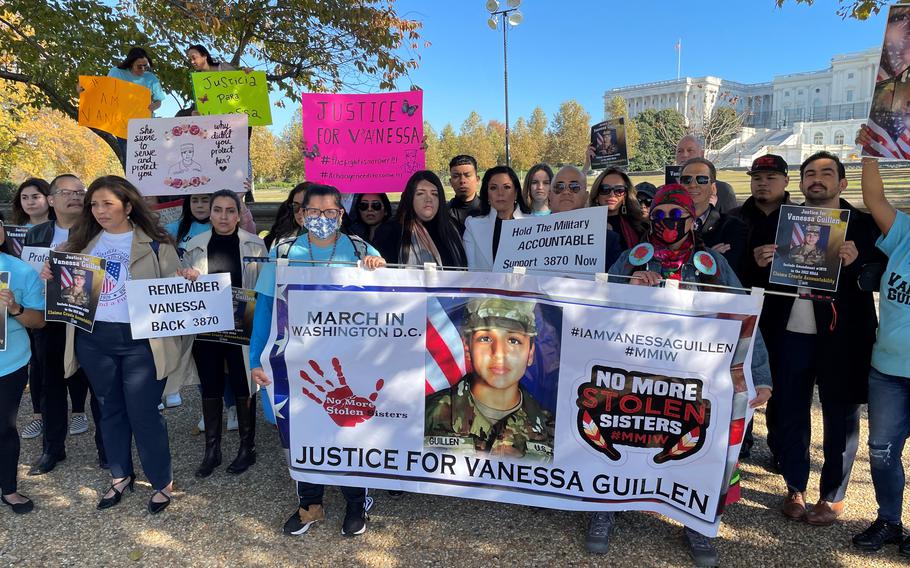
Supporters of military justice reform marched in November in Washington to call for justice for Army Spc. Vanessa Guillen, who was killed at Fort Hood, Texas, in April 2020. More than a dozen military service organizations came together Tuesday to call on Congress to include military justice reform measures in the final version of the 2022 National Defense Authorization Act. (Photo provided by Natalie Khawam )
More than a dozen veteran service organizations came together Tuesday to call on Congress to keep long-sought changes to the way the military handles sexual assault cases in the final version of the 2022 National Defense Authorization Act.
The changes are part of a sweeping military justice measure that would remove the decision to prosecute sexual assault and certain other serious crimes from the chain of command and set up an independent prosecutor to make the call.
In letters sent to leadership of each chamber and of their armed services committees, the groups call for full passage of the legislation, titled the Military Justice Improvement and Increasing Prevention Act. The bill has bipartisan support with 220 co-sponsors in the House and 66 in the Senate.
“The scourge of sexual assault in the military is a serious concern and demands a real solution, not a watered-down provision slipped in the final bill behind closed doors. Retaining the full provision will ensure that the will of this strong majority of both houses of Congress is respected,” wrote the 15 organizations, including Iraq and Afghanistan Veterans of America, Vietnam Veterans of America, Service Women Action Network and the Enlisted Association of the National Guard of the United States.
The National Defense Authorization Act, known as the NDAA, is an annual bill that sets spending and policy for the Defense Department. The House passed a version of the bill in September, but the Senate has not yet completed its draft.
A vote expected last week was delayed until after senators return from the Thanksgiving holiday. Then the two versions of the bill must be reconciled in a conference committee before a final draft is sent to the White House.
Speaking at a military justice rally last week, Sen. Kirsten Gillibrand, D-N.Y., who introduced the justice reform legislation in the Senate, said she fears that once the NDAA goes into conference, the reforms will be stripped away.
“What happens when the doors are closed, and the light is not in? That is where justice goes to die,” Gillibrand said. “We shall not let this legislation be taken out in conference by a committee that is not answerable to you and I. It is not right.”
As it stands now, both chambers have included military justice reform in the NDAA, though with slightly different provisions. The House version only calls for the independent prosecutor to oversee special victim cases of sexual assault and harassment, domestic violence and child abuse. The Senate version expands the prosecutor’s reach to other serious crimes that are not uniquely military crimes.
In the letter sent Tuesday, the organizations said it is important to include all crimes so as not to isolate sexual assault or make it appear “less than.”
“It is well known that survivors have to deal with backlash after reporting the crime, singling out military sexual assault could potentially increase the instances of retaliation. It is imperative that military sexual assault is viewed, and prosecuted, on the same level as any other non-military felony crime,” according to the letter.
This would also address other inequities identified in the military judicial system, the organizations wrote. The Government Accountability Office in 2019 found that Black service members are twice as likely to face judicial proceedings and Hispanic troops are 1.5 times as likely.
“It would be disrespectful to all those that have experienced the injustice this legislation would address to not include the Senate passed verbiage within the NDAA,” according to the letter.